1 But after he began to be ninety-nine years old, the Lord appeared to him and said to him, I am God almighty, walk in my presence and be perfect. 2 And I will put my covenant between me and you and I will multiply you most exceedingly.
3 Abram fell prone on his face 4 and God said to him: I am, and my pact is with you, and you will be a father to many peoples. 5 Nor will your name be called Abram any longer, but you will be called Abraham because I have appointed you the father of many peoples. 6 And I will make you increase exceedingly, and I put you among the peoples, and kings will come from you. 7 And I will establish my pact between me and you, and between me and your seed after you in their generations, in an eternal compact: so that I may be God for you and for your seed after you. 8 And I will give you and your seed the land of your wandering, all the land of Chanaan in eternal possession and I will be their God.
9 Again God said to Abraham: And you therefore will observe my pact, and your seed after you in their generations. 10 This is my pact which you will osberve between me and you, and your seed after you: for all the males out of you to be circumcised, 11 and you will circumcise the flesh of your foreskins, so that it may become a sign of the covenant between me and you. 12 An infant amoung you will be circumcised on the eighth day, ever male among your offspring: the servant and the slave will be circumcised, and whoever is not outside your lineage. 13 And my covenant will be in your flesh as an eternal covenant. 14 A man, whose flesh of the foreskin was not circumcised, that soul shall be deleted from your people because my pact was useless.
15 Likewise, God said to Abraham: Sarai your wife will not be called Sarai but Sara. 16 And I will bless her, and from her I will give you a son whom I am about to bless: and he will become nations, and kings of the peoples will be born from him.
17 Abraham fell on his face, and laughed, saying in his heart: Can a son be born to a centenarian? And Sara, a nonagenarian, give birth? 18 And he said to God: Would that Ismael live, before you.
19 And God said to Abraham: Sara your wife will give birth to your son and you will call his name Isaac and his descendants after him. 20 About Ismael likewise I have heard you: behold, I will bless him, and I will increase him, and I will multiply him vigorously: He will beget twelve princes, and I will make him into a great nation. 21 To Isaac I will establish my pact, whom Sarah will bear to you at this time in the next year.
22 And when the conversation had ended in speaking with him, the Lord went up from Abraham.
23 Therefore, Abraham took Ismael his son, and all the slaves of his house, and all whom he had acquired, every male from all the men of his home: and circumcised the flesh of the foreskin at once on that day as God had instructed him.
24 Abraham was ninety-nine years old when he circumcised the flesh of his own foreskin. 25 And Ismael the son completed thirteen years in the time of his circumcision. 26 Abraham and his son were circumcised on the same day 27 and all the men of his household as the domestic, so the purchased and foreign together were circumcised.
Theological notes
This is the first of God’s covenants with his people. A lot has been written about the covenant of circumcision, with greater depth than I can manage. But it’s still worth noting that Ismael figures strongly in God’s plan, where he will beget twelve princes and be made a great nation. I suppose a big part of that will revolve around the first century Christians’ understanding of the scope of the pact of circumcision and the debate about whether it applied to gentile converts to Christianity or only to Jewish Christians (this was the premier debate of the early church and one that the first pope, Peter, managed to fall firmly on the wrong side of, which given that this was the pope that Jesus himself picked, says something about popes).
Linguistic notes
There were a lot of interesting things happening linguistically in the Latin text of this chapter, but I wanted to focus on the last verse where there was a tam … quam construction. The Douay Rheims translation corresponds reasonably well with my literal translation although they inexplicably garbled the tam … quam rendering it instead of “as … so” instead going with “as well … as” which makes the English a bit of a mess. What I translated “domestic” and the Douay-Rheims translated “they that were born in his house” is in the Latin, vernaculus, which has a range of meanings (I think in a previous chapter I translated it as slave. Digging a bit, it looks like D-R followed the Septuagint which has οἱ οἰκογενεῖς, which, without even consulting a dictionary, I can spot οἰκος referring to the household and γενεῖς relating to birth or perhaps went directly back to the Hebrew with יְלִיד בָּיִת which is born in the house
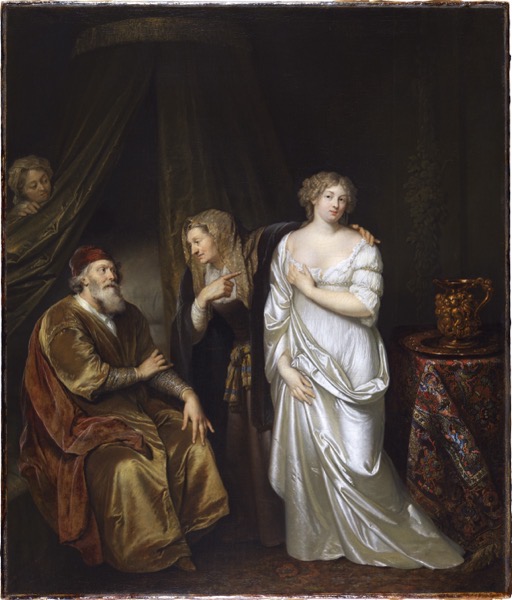 ars after she took Agar her Egyptian handmaiden to begin to dwell in the land of Canaan and she gave her as a wife to her husband. 4 He entered her. And she, seeing herself conceive, despised her mistress.
ars after she took Agar her Egyptian handmaiden to begin to dwell in the land of Canaan and she gave her as a wife to her husband. 4 He entered her. And she, seeing herself conceive, despised her mistress. 
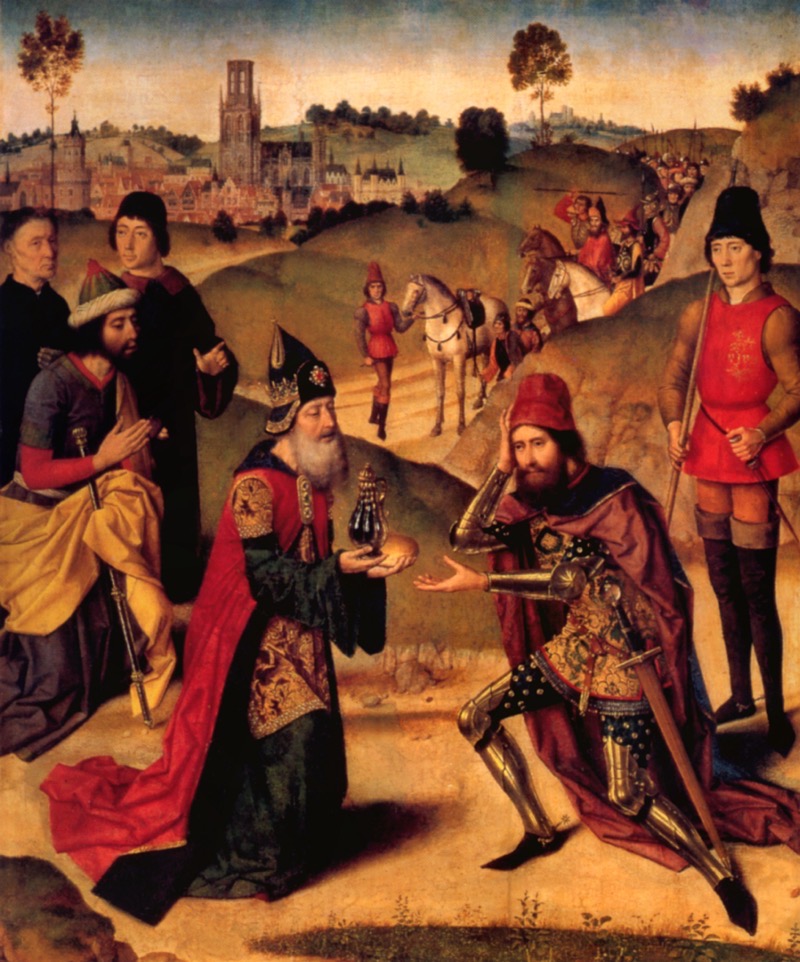 the king of Sennaar, and Arioch the king of Pontus, and Chodorlahomor the king of the Elamites, and Thadal the king of the gentiles 2 began a war against Bara, king of Sodom, and against Sennaab king of Adama, and against Semeber king of Seboim, and against Bala, who is Segor. 3 All these assembled into the Silvestre Valley, which now is a salt sea.
the king of Sennaar, and Arioch the king of Pontus, and Chodorlahomor the king of the Elamites, and Thadal the king of the gentiles 2 began a war against Bara, king of Sodom, and against Sennaab king of Adama, and against Semeber king of Seboim, and against Bala, who is Segor. 3 All these assembled into the Silvestre Valley, which now is a salt sea. 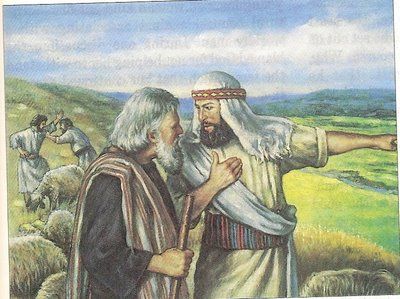 to the southern region. 2 Moreover he was an exceedingly wealthy man in possession of gold and silver. 3 And he returned by the route by which he came, from the south into Bethel, all the way to the place where previously he had set up the tabernacle between Bethel and Hai 4 in the place of the altar which he had made previously, and invoked the name of the Lord.
to the southern region. 2 Moreover he was an exceedingly wealthy man in possession of gold and silver. 3 And he returned by the route by which he came, from the south into Bethel, all the way to the place where previously he had set up the tabernacle between Bethel and Hai 4 in the place of the altar which he had made previously, and invoked the name of the Lord.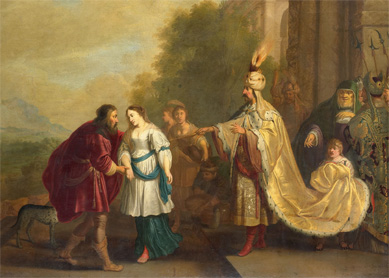 of your land, and from your kindred, and from the home of your father, and come into the land which I will show you. 2 And I will make you into a great nation, and I will bless you, and I will glorify your name, and you will be blessed. 3 I will bless those blessing you, and curse those cursing you, and IN YOU will be blessed the kindred of the whole Earth.
of your land, and from your kindred, and from the home of your father, and come into the land which I will show you. 2 And I will make you into a great nation, and I will bless you, and I will glorify your name, and you will be blessed. 3 I will bless those blessing you, and curse those cursing you, and IN YOU will be blessed the kindred of the whole Earth.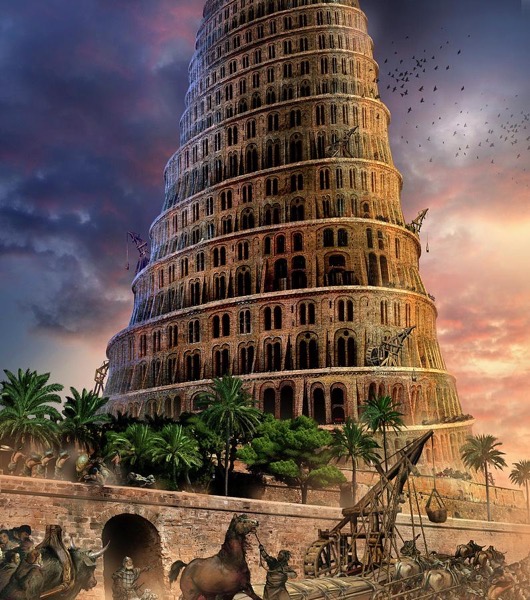 languages 2 and when they advanced out of the East, they found a field in the land of Sennaur and they lived in it. 3 And one said to the next: Come let us make bricks and dry them in fire. And they had bricks for stone and bitumen for cement; 4 and they said: Come, let us make a city for ourselves, and a tower, the roof of which will reach to heaven; and let us celebrate ourselves before we are divided in the whole Earth.
languages 2 and when they advanced out of the East, they found a field in the land of Sennaur and they lived in it. 3 And one said to the next: Come let us make bricks and dry them in fire. And they had bricks for stone and bitumen for cement; 4 and they said: Come, let us make a city for ourselves, and a tower, the roof of which will reach to heaven; and let us celebrate ourselves before we are divided in the whole Earth.